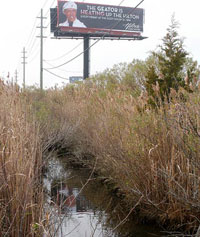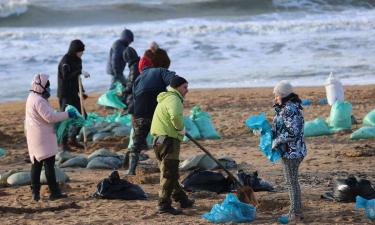Four prostitutes found in ditch year ago, case still under investigation
Hugh Auslander and Kim Raffo met in Brooklyn, New York. They married in Florida and had two children. He worked as a carpenter and his wife looked after their children and volunteered with the Girl Scouts and the school PTA.

But a year ago, her life came to an end that would have been unimaginable in those happier times: She was one of four women whose bodies were discovered in a ditch behind a string of cut-rate motels known for drugs and prostitution, on a road called the Black Horse Pike.
They were barefoot, with their heads facing east toward the casinos of Atlantic City, just a few hundred yards (meters) away. Speculation spread that a serial killer might be on the loose in the city whose motto is "Always Turned On."
Auslander wishes he knew what happened between the time his wife left him and the day she was found, Nov. 20 of last year.
"We get up each day and we wait for answers, some glimmer of hope," he said.
Authorities have been tight-lipped about how the investigation is going, including whether they believe one person killed all four women. The other victims were Barbara Breidor, Molly Jean Dilts and Tracy Ann Roberts.
"We fully recognize that it's been a year since the bodies of the women were discovered," said Atlantic County Prosecutor Theodore Housel. "This is an open, active, important investigation. We are pursuing a number of investigative techniques including, but not limited to, additional forensic tests."
Relatives said Raffo grew bored with life as a housewife. She enrolled in a cooking class and met a man who had a long history of drug use. They started an affair.
Auslander took the kids and left, and Raffo and her boyfriend went to Atlantic City. When she wasn't working as a waitress, they binged on cocaine.
Her habit grew worse and she stopped going to work, eventually selling herself. She started out asking for US$100, but often settled for much less, according to police records and other prostitutes who knew her.
"They lived a very bad life," Auslander said. "I basically gave up on her. Then I heard news that she was in trouble."
The couple's children had since been placed in foster care and Auslander, who continues to chase carpentry work up and down the East Coast, came back from Florida to New Jersey to help her.
"She was extremely excited to get the hell out," he said. "We went to Long Island for five weeks. We were happy there, but it wasn't like we were getting back together or anything. I had another life, she had another life. We were more friends helping each other out.
"Unfortunately, she said she had some unfinished business in Atlantic City," said Auslander, addingthatshe did not elaborate. "We parted ways with the hope of getting together the week after that a week too late."
Raffo's body was the first to be identified. An autopsy determined she had been strangled with a rope or cord and had been in the ditch for a couple of days.
Although they never explicitly said so, Terry Oleson, 35, was once prosecutors' prime suspect in the hooker deaths. He had been staying at the Golden Key Motel the same US$27-a-night hot-sheet hovel behind which the bodies were found just before they were discovered.
Inside his house, which was rigged with hidden video cameras, authorities discovered nude images of his then-girlfriend's 15-year-old daughter.
He was arrested in April in connection with the videotaping, and agreed when prosecutors requested in June that he submit DNA samples.
Authorities still will not say what the tests revealed.
Oleson pleaded guilty to the nude videotaping charge last month and was released on bail until he is sentenced in two weeks. He walked free wearing a tow-truck company T-shirt with the slogan "Off The Hook" written across the chest.
"When he walked out of the Salem County jail, that certainly spoke volumes," said his lawyer, James Leonard. "If they had DNA that linked Terry Oleson to any of these women, without question they would have charged him. I haven't seen a shred of evidence that would link him to these crimes."
Oleson said the past seven months have been "a living nightmare."
"There's no way my DNA was anywhere near them," he said. "I never met them. I wish I had some information for everybody. I hope they find whoever did this."
The case has filled other prostitutes with fear.
"I still think about it every day," said Shorty, a Philadelphia native who started work as a stripper at age 22 and switched to prostitution six years later when she couldn't compete with the young, fresh faces.
Shorty used to carry a knife at all times, but ditched it shortly after the killings, fearing that a violent customer might use it against her. Now she regrets getting rid of it.
She continues "dating" men who drive up along Pacific Avenue and flag her down, mainly to support her crack habit. The four women in the ditch each had also used drugs, authorities said.
"Nobody misses drug addicts," she said. "We disappear, and it's normal. Nobody comes looking for us."
Still, she takes precautions.
"When a guy wants to go to the Black Horse Pike, that's a big, big red flag," Shorty said. "I try to stay in control. I tell them where I'll go with them. Lose control, and you're done."
Subscribe to Pravda.Ru Telegram channel, Facebook, RSS!




